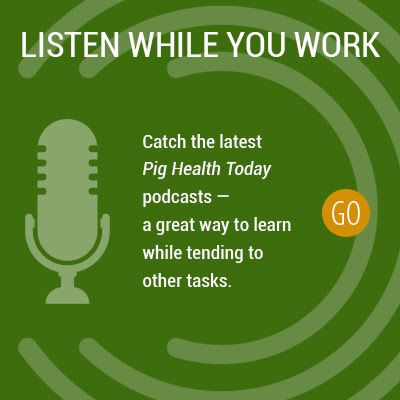Pavlovic: Today’s PED outbreaks may be mild but still hurt profitability
Porcine epidemic diarrhea (PED) virus may not be as devastating to hogs today as it was a few years ago, but it still damages the bottom line, according to Lynn Pavlovic, DVM, Iowa Select Farms.
Pavlovic cited an example from Iowa Select where market hogs showing signs of clinical PED gained 21.4% less in average daily gain than a group of hogs not showing signs of PED. The PED-infected hogs also gained 4.4 pounds less carcass weight than healthy hogs.
“It also took about a week longer to close those sites, which puts us behind (schedule), and there is a cost associated with that,” she added.
Located in hog-dense areas, Iowa Select sees plenty of PED, especially in cold weather. “It’s definitely a challenge,” Pavlovic said. “We may see a little bit of diarrhea and it goes away in a few weeks. I think a lot of times we don’t see the underlying effect it has on performance.”
Tackling PED with biosecurity
Now, Pavlovic tests hogs when PED is suspected. A positive PED diagnosis will ratchet up biosecurity efforts to stop it at the door of the farms.
“We have caretakers who take care of multiple sites,” Pavlovic said. “So, it’s all about teaching them the importance of strict biosecurity, cleaning their vehicles, changing their clothes, washing, cleaning up their offices, so that we can prevent the next group of pigs coming into those barns from getting it, as well as their other farms.”
All of Iowa Select sites are operated all-in/all-out. At the end of a turn, employees wash and disinfect every building.
“For sites with PED, we also add whitewashing,” Pavlovic said. “It’s costly so we tried taking it away this past winter. We did see an increase in disease challenge, so we have reimplemented it. We see a benefit to having a higher pH in the area where we whitewash to help control PED.”
Trucking poses a major biosecurity risk as well. Iowa Select now keeps market-truck washes segregated from other truck washes to prevent contamination.
In addition, the company implemented more biosecurity training for the trucking and wash crews and drivers.
Sow-farm control
“We do a lot of controlling PED at the sow-farm level in things like gilt acclimation,” Pavlovic explained. “We might do some vaccination, especially in regions of Iowa where we have issues year to year. We know there’s a lot of PED virus around.”
The vaccinations occur at certain times of the year on the sow farms. “Hopefully it will provide some immunity to the sows that will carry on downstream,” she added.
Posted on September 24, 2018

















